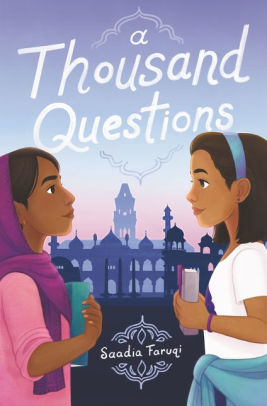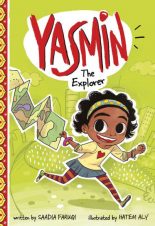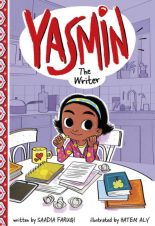
Buy This Book
“There’s no point in crying over the loss of something. I’ve usually found that things aren’t ever lost. One just doesn’t know where they are at that moment,” Nani. — A Thousand Questions
A Thousand Questions
by Saadia Faruqi
AR Test, Diverse Characters, Teaches About Culture
8+
Score
3.2
320
Mimi has a lot of questions, like why is her mother taking her to Pakistan to meet her grandparents? Why did her father leave Mimi and her mom? Where is Mimi’s dad now? Visiting Mimi’s grandparents in Pakistan might not answer all her questions, but she’s determined to figure some of them out.
Sakina wants nothing more than to attend school. Unfortunately, she has to help her father clean Mimi’s grandparents’ lavish house to make ends meet, so going to school for Sakina feels like a pipe dream. Plus she must pass the English language exam to even attend, and Sakina has no one to practice with. That is, until Mimi and her mother arrive from America.
In a meeting of cultures, Mimi and Sakina learn much from each other and eventually become friends. The family and class dynamics surrounding their lives present new ways of looking at the world and their places within it.
Split between Mimi and Sakina’s perspectives, A Thousand Questions tackles topics like class struggles, family relations, and cultural barriers. Mimi is from Houston, and although she and her mother don’t have a lot in the States, Mimi’s grandparents are wealthy in the Pakistani city of Karachi. Sakina is employed, along with her father (Abba), as a servant in Mimi’s grandparents’ household. The friendship between Mimi and Sakina isn’t encouraged at first, and often the differences in class come up when Mimi has more freedom (both financially and socially) than Sakina. Instead of fostering dislike between the two, Sakina is motivated to improve her English and attend school however she can.
Language is a large part of the book. Many of the characters speak Urdu, and Urdu and Arabic words are used throughout. Faruqi does an excellent job of giving contextual clues, so the language-hopping never feels confusing. A glossary is also included at the end of the book to help aid readers. Language is also used as a plot point. Mimi’s Urdu isn’t great, and Sakina’s English is ok, so the two teach each other. In this exchange of languages, there is also an exchange in cultures. The bond that Sakina and Mimi form is heartwarming, even if they don’t always see eye to eye.
Mimi also has a journal where she writes questions to her father. She misses him, and her letters are part of the narrative. Much of the book details her emotional journey as she learns about her parents’ lives and why her father left. At the end of the book, Mimi is able to reach a resolution and seems to make peace with her father’s leaving.
A Thousand Questions tackles important topics regarding culture, friendship, and family, and both Mimi and Sakina grow as people as they learn about each other. This book will appeal to people who are already familiar with Pakistan as well as to people who want to read about a strong friendship and culturally nuanced book. In A Thousand Questions, Mimi and Sakina’s friendship opens their eyes to the world around them, and it will certainly do the same for the reader. This book is a must-read for its diverse content and its ability to tell a moving story about friendship and family.
Sexual Content
- None
Violence
- When Mimi was little, she “crashed [her] bike in the street outside [their] Houston apartment . . . and broke her leg in three places.”
- When Mimi was five, she writes letters to her father who left her and her mother. Mimi never sends them. One day she writes, “Do you ever get angry? Not annoyed or irritated, like most people, but a deep angry that makes you throw something at the wall and watch it crack.” Mimi has not actually done this.
- Sakina’s Abba has diabetes and collapses in the kitchen one day. Sakina, Mimi, and Nani hear “a loud crash” and they rush to get him to the hospital.
- Sakina explains that Raheem, her neighborhood “goonda” or “gangster,” is “going around ordering people to vote for his candidate. Screaming, destroying things.”
- Raheem broke into a neighbor’s house with his stick and broke things inside. Sakina describes, “Broken chairs and tables, a cracked mirror on the wall. Clothes strewn about on the floor.”
- The goondas in Sakina’s neighborhood rob Sakina’s family. They don’t physically hurt anyone, but Raheem threatens to “tear [the house] down” if they don’t hand the money over.
Drugs and Alcohol
- Mimi’s family’s driver smokes. Sakina explains in English that the smoke “makes [her] eyes water.”
- Mimi’s great-uncle smokes a cigar, and Mimi “wrinkles her nose at the smell.”
Language
- Words like dumb, stupid, nuts, shut up, and weird are occasionally used.
- Mimi’s grandmother, Nani, screams at one of the gardeners and accuses him of killing her rose bushes. She calls him a “ulloo-ka-patha.” Mimi doesn’t know what this means, and it isn’t explained further. The glossary in the back explains that it means “son of an owl; used as an insult” in Urdu.
- Mimi’s mom calls Mimi’s father a “deadbeat.”
- Mimi’s grandmother calls Sakina a “lazy oaf” and “fool.”
- Mimi sometimes refers to Nani as “the dragon lady” because of Nani’s fierce temper.
Supernatural
- None
Spiritual Content
- Mimi has a traditional Pakistani dress that she wore twice for “the two Eid celebrations.”
- Eid al-Adha and Eid al-Fitr are two major Islamic holidays.
- When things go wrong, Sakina’s father never gets worried. He always says, “It’ll be all right. God will provide.” Sakina doesn’t buy this, saying “God listens to rich people, not to people like Abba [her father] and [her].”
- Abba frequently thanks God for the good things in their life.
- The mosque down the street from Mimi’s grandparents’ house uses a loudspeaker to announce prayer times. Mimi describes, “a loudspeaker crackles to life, and a melodious sound fills the air around us. Allahu akbar. Allahu akbar. God is great. God is great.” This happens a few times throughout the book.
- Mimi thinks to herself, “Maybe if I help Sakina with her admission test, God will reward me by bringing my dad back. And maybe pigs will fly.”
- Mimi and Sakina talk about why poverty exists. Sakina says, “Abba says it is the will of God.” To this, Mimi replies, “How can God allow some people to have everything and others to have nothing? How can He be the Creator of both Pakistan and America? The two are like day and night. God is supposed to love us equally. Isn’t He?”
- Malik, the family driver, joins in Mimi and Sakina’s conversation about God. He says, “God gives each of us free will to do whatever we want. Sometimes human beings are bad to each other. They steal and hurt and lie. They don’t take care of the less fortunate.”
- Malik goes to do the “maghrib prayer” one evening.
- Sakina and Mimi also attend the maghrib prayer. Mimi describes the scene, saying, “I wrap my scarf around my head and follow [Sakina’s] actions. Standing, sitting, prostrating. It’s familiar and strange at the same time, as if I’ve done this a thousand times in a dream. Oh God, if you’re there, send Dad to me. Please. Just for a few minutes, so I can hug him one time.” Mimi finds that she enjoys prayer time.
- Sakina admits to Mimi that she hasn’t prayed “in a long time” because she finds “it hard to believe in God these days.”
- Sakina lies to gain access to Mimi’s father’s workplace. Sakina thinks “the God that Abba believes in—the God I felt around me in that marketplace mosque—will forgive me.”
- Mimi insists that her mom should be looking for Mimi’s father. Mimi’s mother replies, “He left us . . . Why would I go chasing after him? Why would I ever want to find him for God’s sake?”
- Various characters make comments using “God” and “Allah” throughout.
- Sakina’s mother, Amma, sees the money that Mimi and her mother have left for them. Amma says, “Mimi and her mother are angels of God.” Sakina isn’t as certain about this but does see the money as “a miracle.”
- Before her exam, Sakina says “a quick little prayer under [her] breath.”
- Occasionally, characters will say, “Alhamdolillah,” which means, “All praise to God” in Arabic. They also sometimes say “Inshallah,” which means, “God willing” in Arabic.
by Alli Kestler

















